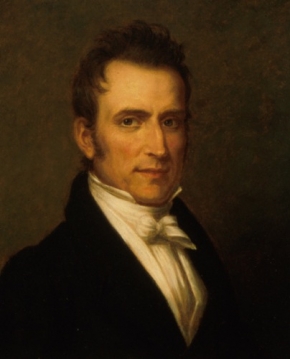You are here
Circuit Court Opinions:
Associate Justice John McLean, Vaughan v. Williams (1845)

Vaughan v. Williams, 28 F. Cas. 1115 (C.C.D. Ind. 1845) (No. 16,903) [Seventh Circuit]
Justice McLean was allotted to the Seventh Circuit for the duration of his career on the Supreme Court. Consisting of northern states—Illinois, Indiana, Michigan, and Ohio—the circuit was home to many fugitive slave cases. While McLean was the strongest opponent of slavery amongst his brethren on the Court, he typically was forced to rule in favor of slaveholders seeking the return of fugitive slaves and damages against northerners who had harbored them or interfered with their recapture. In Jones v. Van Zandt (1843), for example, a Kentucky citizen claiming rights to enslaved people who escaped to Ohio sought damages from the defendant, who had allegedly harbored them. The case was brought under the Fugitive Slave Clause of the Constitution, which stated that an enslaved person escaping to a free state did not thereby become free, and the Fugitive Slave Act of 1793, which provided for fines and suits for damages against those aiding fugitive slaves. In charging the jurors, McLean urged them to ignore the arguments in favor of abolition that had been made at trial (largely by the defendant’s attorney, future Chief Justice Salmon P. Chase), to focus solely on the law, and “to guard yourselves against any improper influence.” The jury found for the plaintiff, and McLean joined the majority in upholding the verdict in the Supreme Court.
Vaughan v. Williams provided McLean with a rare opportunity to rule against slavery, however. In that case, a Missouri slaveholder traveled to Indiana to recapture alleged fugitives who had fled there. After finding the fugitives, the plaintiff intended to bring them before a court, seeking a judgment that he was entitled to bring them back to Missouri. The enslaved people once again escaped, however, aided by a group that allegedly included the defendant. In charging the jury, McLean asserted that the evidence had shown that the fugitives were entitled to their freedom. A previous slaveholder, who sold them to the person from whom the plaintiff purchased them, had taken them to Illinois several years earlier and employed them there for six months. According to decisions from the Supreme Court of Missouri, which provided the rule of decision in the case, their time in the free state of Illinois had abolished their status as enslaved people. Following McLean’s instruction on the law, the jury found for the defendant.
The Missouri court reversed its position in 1852, reaching the opposite conclusion in the freedom suit of Dred Scott. Scott’s defeat led him to seek relief in federal court, which the Supreme Court of the United States denied in Chief Justice Roger Taney’s infamous opinion in Dred Scott v. Sandford (1857). McLean dissented from that ruling, penning an opinion in which he cataloged the line of Missouri cases holding formerly enslaved people to be free under the same circumstances present in Vaughan and Dred Scott.
